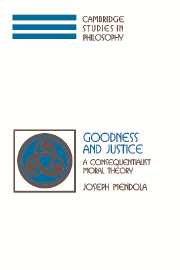
In ethics, cognitivism is the view that ethical sentences express propositions and can therefore be true or false (they are truth-apt), which noncognitivists deny.
General idea
But cognitivism can also agree with ethical irrealism or anti-realism. Ethical naturalism (or ethical realism) and ethical cognitivism are different meta-ethical theories. Cognitive irrealist theories accept that ethical sentences can be true or false, even if there exist no natural, physical or in any way real (or «worldly») entities or objects to make them true or false. In a similar way as there is no real entity to make true the sentence "If it had rained yesterday, the floor would have been wet." or any other counterfactual sentence (except for those who accept modal realism).
Crispin Wright, John Skorupski and some others defend normative cognitivist irrealism. Wright asserts the extreme implausibility of both J. L. Mackie's error-theory and expressivism (including S. Blackburn's quasi-realism) in view of everyday or sophisticated moral talk and argument. The same point is often expressed as the Frege-Geach problem. Skorupski distinguishes between receptive awareness, which is not possible in normative matters, and non-receptive awareness (including dialogical knowledge), which is possible in normative matters.
Hilary Putnam's book Ethics without ontology (Harvard, 2004) argues for a similar view, that ethical (and for that matter mathematical) sentences can be true and objective without there being any objects to make them so.
Cognitivism points to the semantic difference between imperative sentences and declarative sentences in normative subjects. Or to the different meanings and purposes of some superficially declarative sentences. For instance, if a teacher allows one of her students to go out by saying «You may go out.», this sentence is neither true or false. It gives a permission. But, in most situations, if one of the students asks one of his classmates whether she thinks that he may go out and she answers «Of course you may go out.», this sentence is either true or false. It does not give a permission, it states that there is a permission.
Another argument for ethical cognitivism stands on the close resemblance between ethics and other normative matters, such as games. As much as morality, games consist of norms (or rules), but it would be hard to accept that it be not true that the chessplayer who checkmates the other one wins the game. If statements about game rules can be true or false, why not ethical statements? One answer is that we may want ethical statements to be categorically true, while we only need statements about right action to be contingent on the acceptance of the rules of a particular game - that is, the choice to play the game according to a given set of rules.

No comments:
Post a Comment